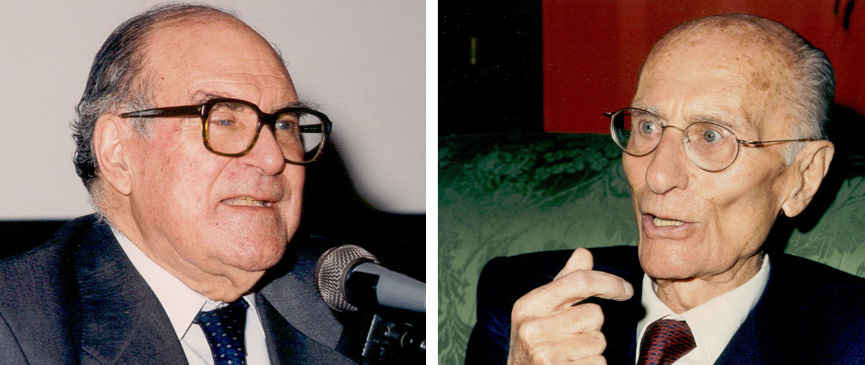The Princess of Asturias Foundation
Sección de idiomas
Fin de la sección de idiomas
Sección de utilidades
Fin de la sección de utilidades
- The Foundation
- HM The King
- HRH The Princess of Asturias
- 2023 Special
- Princess of Asturias Awards
- Area of Communication and Media
- Music Department
- Exemplary Town of Asturias Award
- 2012 Special
- 2013 Special
- 2014 Special
- 2015 Special
- 2016 Special
- 2017 Special
- 2018 Special
- 2019 Special
- 2020 Special
- 2021 Special
- 2022 Special
-
Important: COVID-19
-
Terms of Use
You are in:
Laureates
Start of main content
Indro Montanelli and Julián Marías Aguilera
Prince of Asturias Award for Communication and Humanities 1996

To the clarity and meticulousness of his books and essays, we must also add extensive journalistic work in research and publication.
Indro Montanelli
See more
Indro Montanelli (Fucecchio, Florence, Italy, 1909 – Milan, Italy, 2001) was considered to have been one of the most prestigious journalists in the world and especially in his country, Italy. He completed his higher education at the Sorbonne in Paris, where he majored in Political Science and Law, completing studies in German History. He was a correspondent and columnist for the Il Corriere della Sera between 1939 and 1972. As a foreign correspondent, he covered the two fronts of World War II and the Spanish Civil War.
He left the Il Corriere della Sera in 1974 due to a change in the newspaper’s ideological slant and founded the Milan independent daily newspaper Il Giornale. Because of its clear and frank editorial line against both right- and left-wing terrorism, he was the victim of an attack in which two members of the Red Brigades shot him in the legs in June 1977. Years later, he visited an exhibition by prison inmates in Milan where he shook the hand of those who committed the attack against him and expressed his forgiveness.
As well as a journalist, he is also known as a writer, publishing books as prestigious as Storia di Roma [History of Rome] (1957), Storia dei Greci [History of the Greeks] (1958), Garibaldi (1962) and Dante e suo secolo [Dante and His Century] (1964), among others, as well as novels like Il Generale Della Rovere [General Della Rovere] and I sogni muoino all’alba [Dreams Die at Dawn].
Julián Marías Aguilera
See more
A prestigious philologist, sociologist and renowned essayist, Julián Marías Aguilera (Valladolid, Spain, 1914 – Madrid, Spain, 2005), disciple and friend of Ortega y Gasset from 1932 and for 23 years, he founded together with the great thinker the Instituto de Humanidades de Madrid, of which he was later the director. In October of 1964 he was elected permanent member of the Real Academia Española (Royal Spanish Academy), occupying chair "S". Amongst other relevant institutions, he is also member of the Real Academia de Bellas Artes de San Fernando (Royal Academy of Fine Arts of San Fernando), of the Hispanic Society of America in New York, of the Institut International de Philosophie, of the International Society for the History of Ideas, of the Council Scholars of the Washington Congressional Library and, since 1971, corresponding member of the Academia de Artes y Ciencias de Puerto Rico (Academy of Arts and Sciences of Puerto Rico). Marías was, moreover, the only intellectual of the Castilian language to figure as a member of the International Papal Council for Culture, created by Pope John Paul II in 1982.
He possesses an extensive bibliography, made up of more than fifty books, from which we might single out titles such as Introducción a la filosofía, Historia de la filosofía, Ortega y la razón vital, Método histórico de las generaciones, Los españoles, El oficio del pensamiento or La España imposible en tiempos de Carlos III.
Amongst the awards he received are the Fastenrath prize (1947) for his work "Miguel de Unamuno", the Kennedy prize from the Instituto de Estudios Norteamericanos in Barcelona (1964), the Juan Palomo prize (1971), the Gulbenkian for essays (1972), the Ramón Godó for journalism (1975), the Castille and Leon award for the Arts (1988) and the Bravo award (1988).
End of main content
Sección de utilidades
Fin de la sección de utilidades
- Legal document Legal document (Access key 8)
- | Privacy policy Privacy policy (Access key )
- | Social networks ???en.portal.pie.menu107.title???
- | Cookies ???en.portal.pie.menu110.title???
- | Site map Site Map (Access key 3)
- | Contact Contact (Access key )
- | XHTML 1.0
- | CSS 2.1
- | WAI 'AA
© Copyright 2024. FUNDACIÓN PRINCESA DE ASTURIAS



